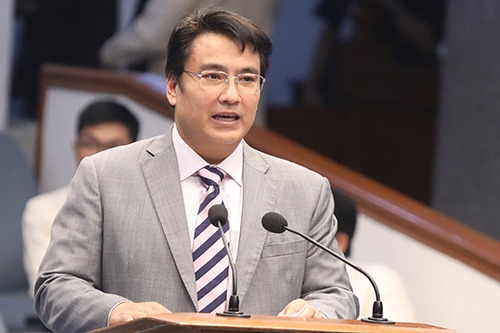Bong Revilla’s Lawsuit Plan: Just Because You Can, Doesn’t Mean You Should
Bong Revilla says fake news and vloggers cost him the 2025 Senate race. But was it really misinformation—or did voters simply outgrow budots politics? This blog explores how lawsuits, misread messaging, and a changing electorate all collided in one loud, avoidable loss.


I was halfway through my morning coffee when I read that Senator Bong Revilla was gearing up to file multiple cyber libel cases. Not against political rivals. Not against survey firms. But against vloggers.
He didn’t say who. No links, no pages, no posts were mentioned—just a sweeping claim that misinformation spread online and cost him a seat in the Senate.
To be fair, politics in this country has always had its share of dirty tricks. But something about this—this need to single out nameless content creators—feels like a deflection more than a defense.
And I sat there wondering: Was it really about fake news? Or was the public just done dancing along?
Because this wasn’t a smear campaign. It was a shift. One that’s been building for years. And now, it’s arrived—loud enough to be heard even over the bassline of budots.
The Case He Wants to File
Once the results came in, Revilla didn’t take the loss quietly. His lawyer, Raymond Fortun, announced that they’re preparing five to ten cyber libel cases against vloggers and online creators. The reason? Allegedly damaging posts and videos that painted him in a bad light during the campaign (Manila Times, BusinessWorld).
But even Fortun admitted that the posts didn’t seem organized. No clear links. No known network. No central figure pulling the strings (GMA). So what is this really about? A legal move—or a performance?
The alleged offenses center on two things:
That Revilla was convicted in the pork barrel scam
That he was ordered to return ₱124.5 million and outright refused.
Revilla denied ever saying he wouldn’t return the money. According to him, that quote was fabricated. But the confusion isn’t baseless. In 2018, while he was cleared of plunder charges, the Sandiganbayan decision also stated:
“The accused are held solidarily and jointly liable to return to the National Treasury the amount of ₱124.5 million.” (Inquirer)
It’s not as cut-and-dry as his team wants it to be. The court’s language was open-ended. It didn’t spell out exactly who should return the money—just that someone among the accused should. That line alone is enough to stir public doubt. And people reacted—not with lies, but with interpretation.
Now Revilla’s team is holding onto Article 100 of the Revised Penal Code as if it clears everything. But even legal experts have pointed out that it doesn’t automatically erase civil obligations—especially when the ruling itself didn’t say who gets off the hook.
Fortun also said that the supposed smear posts intensified two weeks before election day. If that were true, why not confront it head-on while the campaign was still alive? Why wait until defeat before deciding it was all malicious?
To me, this wasn’t defamation. It was accountability catching up.
The Rise of the Informed Voter
It wasn’t a smear campaign that cost Bong Revilla his Senate seat.
It was math.
This year’s elections were powered by numbers no dance routine could sway. Millennials and Gen Z voters—those born between 1981 and 2007—accounted for 63% of the entire voting population in 2025. Let that settle for a second. Nearly two-thirds of all voters were people who grew up with the internet, knew how to fact-check, and weren’t impressed by recycled campaign ads dressed up in disco beats (GMA Network).
Gen Z alone ballooned from 13 million voters in 2022 to almost 22 million in 2025. They didn’t just show up—they participated. Youth turnout reached a record-breaking 81.65%, the kind of number political operatives usually only dream about (ABS-CBN).
And unlike the generations before them, these voters didn’t rely on posters or jingles or heavily edited speeches. They looked things up. They watched old hearings. They checked if a candidate’s track record matched their campaign promises. And if it didn’t, they moved on.
They’re the kind of voters who know that being acquitted isn’t the same as being innocent. The kind who understand that popularity isn’t proof of integrity.
Revilla tried to dance them back into his corner. But the crowd had changed.
This isn’t 2019 anymore. The voters who once found budots amusing now wanted bills, positions, and receipts. They wanted clarity. They weren’t just watching—they were weighing.
It wasn’t just that Revilla lost. It was that other candidates—Bam Aquino, Kiko Pangilinan—did better than anyone expected. Not because of viral videos, but because younger voters saw them as competent, consistent, and clear about what they stood for (BusinessMirror).
This wasn’t a backlash. It was a generation choosing better.
Not everyone was rejected. But those clinging to outdated campaign formulas? They got left behind.
And maybe that’s what this really is. Not rejection. Not sabotage. Just a generation that grew up, looked around, and started making different choices.
The Fall of Budots Politics
Bong Revilla didn’t just dance during this campaign—he doubled down on it.
He brought budots back like it was still 2019. New remixes. A cameo from DJ Love. TikTok-friendly cuts of him smiling and moving to the beat. It was loud, polished, and clearly designed to go viral again (Rolling Stone PH, YouTube).
And just like that, it fizzled.
He tried to frame it differently this time. Said it wasn’t just dancing—that it represented his work.
“Nag-budots ako ng 2,000 panukalang batas, 343 na batas.”
A catchy line. But no one was clapping.
Back in 2019, the same routine helped him land a Senate seat. He was ranked 11th then. The public laughed along, maybe even admired the confidence. It felt new—like he was in on the joke.
But this time, the same act felt like a rerun. What once seemed clever now felt like noise.
And it wasn’t just him.
Manny Pacquiao couldn’t turn his fame into votes.
Willie Revillame, who had airtime and name recall, lost badly.
Philip Salvador, another familiar name, didn’t stand a chance.
It wasn’t sabotage. It was saturation (CSIS, Politico.ph).
The public didn’t conspire against them.
They simply got tired of watching people act like politics is a skit.
No viral dance can replace a clear policy.
No punchline can patch over a questionable past.
And this year, voters said that with their ballots—firmly and without fanfare.
There was a time when performance was enough. When you could win on name recognition, smiles, and a theme song. But something shifted. And it didn’t shift in Revilla’s favor.
The audience didn’t turn hostile.
They just walked away from the show.
The Real Issue Isn’t Misinformation—It’s Relevance
Bong Revilla has been in the public eye for most of his life. Actor. Senator. Meme. And now—complainant.
Maybe that’s part of what makes this lawsuit feel off. Because it doesn’t read like a defense. It reads like a reaction to being—finally—ignored.
For someone who once coasted on popularity, being placed 14th must sting. After all the music, the choreography, and the noise, the voters didn’t turn away because they were misled. They turned away because they were done.
The lawsuit says it’s about lies. But if we’re being honest, it looks more like an attempt to pull the spotlight back. One last curtain call.
It’s one thing to respond to disinformation. It’s another to threaten people for remembering. Most of what was said online wasn’t pulled from thin air. It came from court rulings, press statements, and old headlines. Were some posts edited for drama? Probably. But that’s not the same as being malicious.
When someone starts filing cases because too many people are talking, it’s not about setting the record straight. It’s about control—fear of losing control of how the story is told.
And that’s the real danger. When criticism is labeled as defamation, what’s left for people to say? If every callout risks a lawsuit, public discussion turns into a guessing game about what’s safe to post.
Social media didn’t create his loss. It amplified what people were already thinking. And maybe that’s what hurts more—not the message, but how many people heard it.
He had options. He could’ve addressed the PDAF issue directly. He could’ve spoken with humility and honesty. Instead, he went quiet when it mattered and chose legal action when it was too late.
So no, this isn’t about misinformation.
It’s about timing. It’s about trust. It’s about a public that finally started paying attention—and didn’t like what they saw.
Just Because You Can, Doesn’t Mean You Should
No one’s saying Bong Revilla isn’t allowed to file a case. If he wants to chase vloggers through the courts, no law stops him.
But let’s be honest. That plan feels eerily similar to something Rodante Marcoleta would do—not to correct the record, but to silence it.
We’ve seen this kind of move before. It doesn’t clear the air. It doesn’t bring clarity. It just reinforces the feeling that the powerful don’t want to be questioned.
And when the criticism finally comes, too many entertainer-politicians keep reading it wrong.
Manny Pacquiao did something similar, not with lawsuits—but with tone. When people called him “bobo,” he didn’t confront the concern. He turned the insult into a slogan. He made “bobo” his battle cry. Even political strategist Alan German was stunned, calling the move self-defeating and completely out of touch with what voters needed to hear.
Revilla’s budots defense follows the same path.
When the dance was mocked, he didn’t step back and reassess.
He just said he “budotsed” through 2,000 bills and 343 laws—as if that was supposed to answer anything.
But not all public figures missed the signs. Benhur Abalos—although not an entertainer—read the room better than most. He understood that platform-based campaigning was what Gen Z and Millennials were looking for. His messaging wasn’t perfect—too many tarpaulins, too many lines that didn’t quite land—but his approach made sense. The execution, though, fell short.
He was close.
And that’s what makes this all the more frustrating.
Because this could’ve gone differently.
Here’s a wild idea: instead of filing a case, why not analyze what happened? Look at the numbers. Study the shift. Find out what changed. The data is there. People will probably hate me for suggesting it—but that’s what data-driven people do. They don’t blame the crowd. They read the room.
If you want people to take you seriously? Take your job seriously.
You’re in the Senate. That means something. Or at least it should.
Instead, you share that chamber with another entertainer—someone now being thanked by the public not for what he accomplished, but because through him, we finally saw how useless and misplaced celebrity can be in lawmaking.
Have you tried talking to him?
Maybe coach him?
You know who I’m talking about.
Because if we’re being real—there’s still a role for you. But not if your first instinct is to sue the internet for remembering who you were.
Or maybe it’s easier to file a case than to face a mirror.
Contact us
subscribe to morning coffee thoughts today!
inquiry@morningcoffeethoughts.org
© 2024. All rights reserved.
If Morning Coffee Thoughts adds value to your day, you can support it with a monthly subscription.
You can also send your donation via Gcash: 0969 314 4839.
